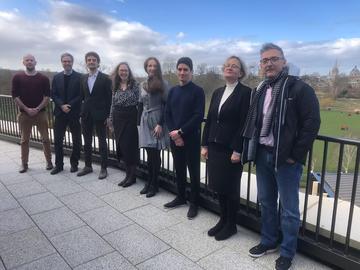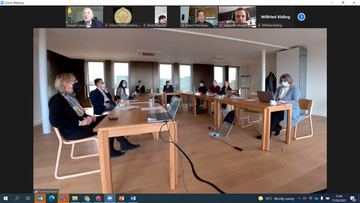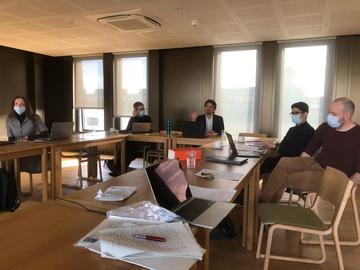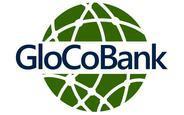GloCoBank annual workshop (Feb 2022)

From right, Dariusz Wojcik, Glenda Sluga, Uziel Gonzalez, Alena Pivavarava, Catherine Schenk, Marco Molteni, Thibaud Giddey, Raphael Heim
The GloCoBank project hosted its first annual workshop on 17 February 2022 with the aim of providing an opportunity for research team members to present and discuss their initial findings and to gain input on their projects and research direction from the project’s external advisory panel and associated researchers. The workshop was attended by 22 colleagues and was held as a hybrid event with participants attending in person at St Hilda’s College in Oxford and joining virtually via Zoom.
After an introduction by project PI Catherine Schenk, the group heard from the first guest speaker Professor Youssef Cassis (EUI) who joined via Zoom to talk about his ERC project ‘The Memory of Financial Crises: Financial Actors And Global Risk’ (MERCATOR). The 5-year project which started in 2021 explores whether memory, or the absence of memory, of past financial crises can explain practices threatening the stability of the financial system. The project, which is unique in combining financial history and memory studies in a single study, aims to better understand, in a long-term historical perspective, the recurrence of financial crises, and the behaviour of financial agents, and features a vast programme of oral history interviews and surveys,
Professor Glenda Sluga (EUI) then introduced her new ERC project ‘Twentieth Century International Economic Thinking’ (ECOINT). The project aims to provide an integrated history and deeper understanding of the registers of international economic thinking that facilitated global economic integration. Focusing on the period between 1919 and 2001, the project will study mid-level and ‘non-intellectual’ international academic thinkers, leading to a history of women economic thinkers working with and at international institution. As well as producing an empirical research database of economic thinkers, the project will coordinate an outreach programme dedicated to expanding public debate around the diverse ideological international roots of globalisation and the difference that women economic thinkers made.
Finally Professor Dariusz Wojcik (School of Georgraphy and the Environment, University of Oxford) shared some of the findings of his ERC project on ‘Cities in Global Finance Networks’ (CityNet). The project, which started in 2016 and covers over 20 established and emerging financial centres spanning six continents, seeks to better understand the nature and dynamics of financial and business services (FABS), and their implications, and to develop a new theoretical framework of Global Financial Networks, which positions FABS and their networks in the broader economy.

The afternoon session was dedicated to presentations by GloCoBank team members and discussion of projects. Professor Catherine Schenk introduced the project and its objectives and talked about the project’s main data source ‘The Bankers’ Almanac’ and the opportunities and challenges it presents. She went on to present data collected from the British Banks section of the Bankers Almanac describing some of the patterns and strategies employed by British respondents over the period 1935-1985, with a focus on the increasing presence of Japanese banks and correspondents relations from 1978.
Postdoctoral researcher in European Networks, Dr Thibaud Giddey, provided a first glimpse of the archival material he has collected from Belgian banks and other archives which help to develop the picture of correspondent banking at banks including Societe Generale, Banque de Bruxelles, Zürcher Kantonalbank and Deutsche Bank. As well as providing an overview of Brussels as a financial centre, Thibaud shared examples of internal bank documents such as board minutes with information about correspondent banking credit limits, comments on internationalisation strategies, notes on the profitability of correspondent banking, as well as internal organisational structure diagrams relating to correspondent banking activities.

The project’s two postdoctoral researchers in data analysis, Dr Marco Molteni and Dr Alena Pivavarava, introduced the new dataset that the project is creating from data collected from the International Banks section of the Bankers’ Almanac which provides details of the London and New York correspondents of international banks between 1920 and 1985. As well as discussing some of the challenges and limitations of working with this source, it was possible to share initial visualisations reflecting the expansion and contraction of correspondent banking networks over this period.
Dr Alena Pivavarava then went on to share insights from the work that she has been doing using data from the Rand McNally banking directories focusing on Canadian banks between 1879-1942, their branch networks and cross-border correspondent banking networks with the US. The detailed data showing the spread of bank branching across towns and cities in Canada combined with banks' correspondent links across the border to the USA is extremely promising.
The workshop was a wonderful opportunity for the GloCoBank team to share its initial findings and to gain feedback on their research, as well as to learn from and make connections with colleagues working on cognate projects. Many thanks to everyone who took part; we look forward to developing these collaborations in the future and sharing our future outputs with the project's research community.
Programme
| 10.30am: | Welcome, introductions - Catherine Schenk (Principal Investigator, GloCoBank Project, Oxford) |
| 10.45am: | The Memory of Financial Crises: Financial Actors and Global Risk, Youssef Cassis (European University Institute) |
| 11.15am: | International Economic Thinking, Glenda Sluga (European University Institute) |
| 11.45am: | Cities in Global Financial Networks, Dariusz Wojcik (School of Geography and the Environment, Oxford) |
| 12.15pm: | General discussion |
| GloCoBank Project Presentations | |
| 2.00pm: | Cross-border correspondent banking: evidence from London banks 1935-1985, Catherine Schenk (PI, GloCoBank Project, Oxford) |
| 2.50pm: | Correspondent banking as a strategy of international banking: first glimpse of archival material from Belgian banks, Thibaud Giddey (Post-Doc Researcher-European Networks, GloCoBank Project, Oxford) |
| 4.00pm: | Global Correspondent Banking: a first look at the data 1920-1985, Marco Molteni (Post-Doc Researcher-Data Analysis, GloCoBank Project, Oxford); Alena Pivavarava (Post-Doc Researcher-Data Analysis, GloCoBank Project, Oxford) |
| 4.50pm: | Canada-US cross-border correspondent banking 1879-1942: Rand McNally data, Alena Pivavarava (Post-Doc Researcher-Data Analysis, GloCoBank Project, Oxford) |
| 5.40pm: | General discussion/wrap-up |
| 6.00pm: | Close |
| 7.30pm: | Workshop dinner |
Participants
Sebastian Alvarez (Graduate Institute, Geneva)
Youssef Cassis (European University Institute)
Thibaud Giddey (GloCoBank Project, University of Oxford)
Linda Goldberg (Federal Reserve Bank of New York)
Uziel Gonzalez (DPhil, University of Oxford)
Raphael Heim (DPhil, University of Oxford)
James Hobby (MSc, University of Oxford)
Krystof Jirku (MSc, University of Oxford)
Wilfried Kisling (Vienna University of Economics)
Jason Lennard (Lund University)
Vittorio Maresca Di Serracapriola (MSc, University of Oxford)
Robert McCauley (Associate Member, History Faculty, University of Oxford)
Simon Mollan (University of York)
Marco Molteni (GloCoBank Project, University of Oxford)
Kirsty Peacock (DPhil, University of Oxford)
Claire Phillips (GloCoBank Project, University of Oxford)
Alena Pivavarava (GloCoBank Project, University of Oxford)
Catherine Schenk (GloCoBank Project, University of Oxford)
Hyun Shin (Bank for International Settlements)
Glenda Sluga (European University Institute)
Dariusz Wojcik (University of Oxford)



